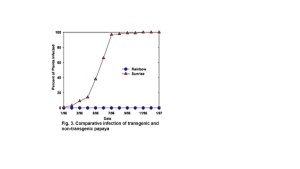 Doutorando: Osvaldo Francisco Lino Sande (17/10/2017 às 17:00 horas). Transgenic papaya resistant to Papaya ringspot virus (PRSV) was the first genetically-modified crop to be produced and commercialized on a large scale in the world. The development of transgenic papaya using a pathogen-derived resistance (PDR) approach was due to the fact that resistance genes were not available for the development of resistant genotypes by conventional breeding techniques and the management strategies based on chemical control of the insect host for virus were inefficient. At the time, the mechanism by which resistance was achieved was not completely understood. Nowadays, PDR against viruses is known to be due to posttranscriptional gene silencing, and the mechanism is know in great detail.
Doutorando: Osvaldo Francisco Lino Sande (17/10/2017 às 17:00 horas). Transgenic papaya resistant to Papaya ringspot virus (PRSV) was the first genetically-modified crop to be produced and commercialized on a large scale in the world. The development of transgenic papaya using a pathogen-derived resistance (PDR) approach was due to the fact that resistance genes were not available for the development of resistant genotypes by conventional breeding techniques and the management strategies based on chemical control of the insect host for virus were inefficient. At the time, the mechanism by which resistance was achieved was not completely understood. Nowadays, PDR against viruses is known to be due to posttranscriptional gene silencing, and the mechanism is know in great detail.
The production of transgenic papaya had a major socio-economic impact on the local industry and worldwide. Production levels previously affected by the virus were reestablished and allowed the replanting of non-transgenic cultivars. Since its commercial release in 1998, the local transgenic cultivar papaya continues to perform well. No resistance breakdown has been reported, which is remarkable considering that RNA viruses such as PRSV have high nucleotide substitution rates, having the capability to evolve very rapidly.
Several risks associated with the production and consumption of transgenic plants have been raised over the years. The case of PRSV resistant papaya provides a unique scenario for assessing these risks, since large scale planting has been going on for almost 20 years. Several studies have been performed, and they found no occurrence of mechanisms of heteroencapsidation, recombination or synergism between the transgene and other related viruses. Any effects of the transgene on non-target organisms have not been detected as well.
Considering the success of PRSV-resistant papaya, it is surprising that no other virus-resistant crops are being planted today. The complex regulatory scenario now existent in many countries (and which did not exist back in the mid-1990’s) is certainly one of the main reasons. It is unfortunate that this scenario is preventing the deployment of virus-resistant crops that could control many intractable viral diseases in several crops.
Orientador: Francisco Murilo Zerbini Júnior
Data e horário: 17/10/2017 às 17h
Local: Anfiteatro do ESB
